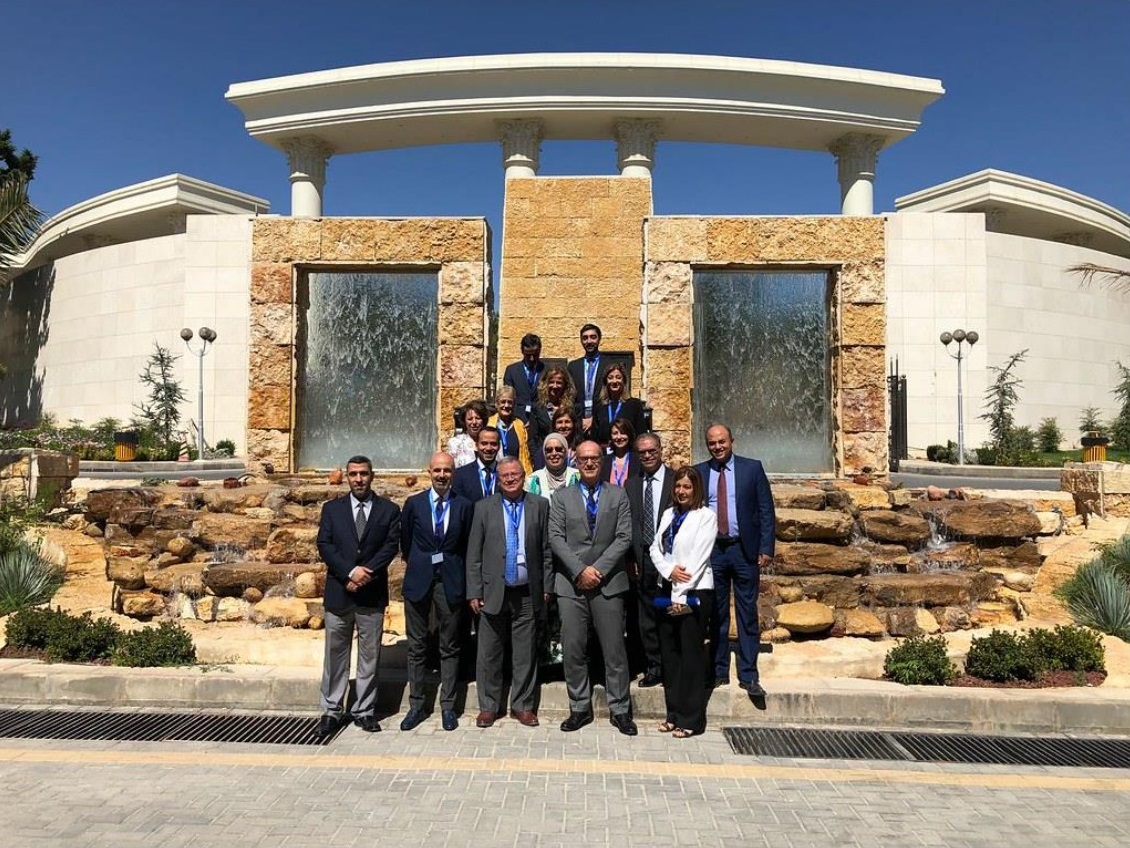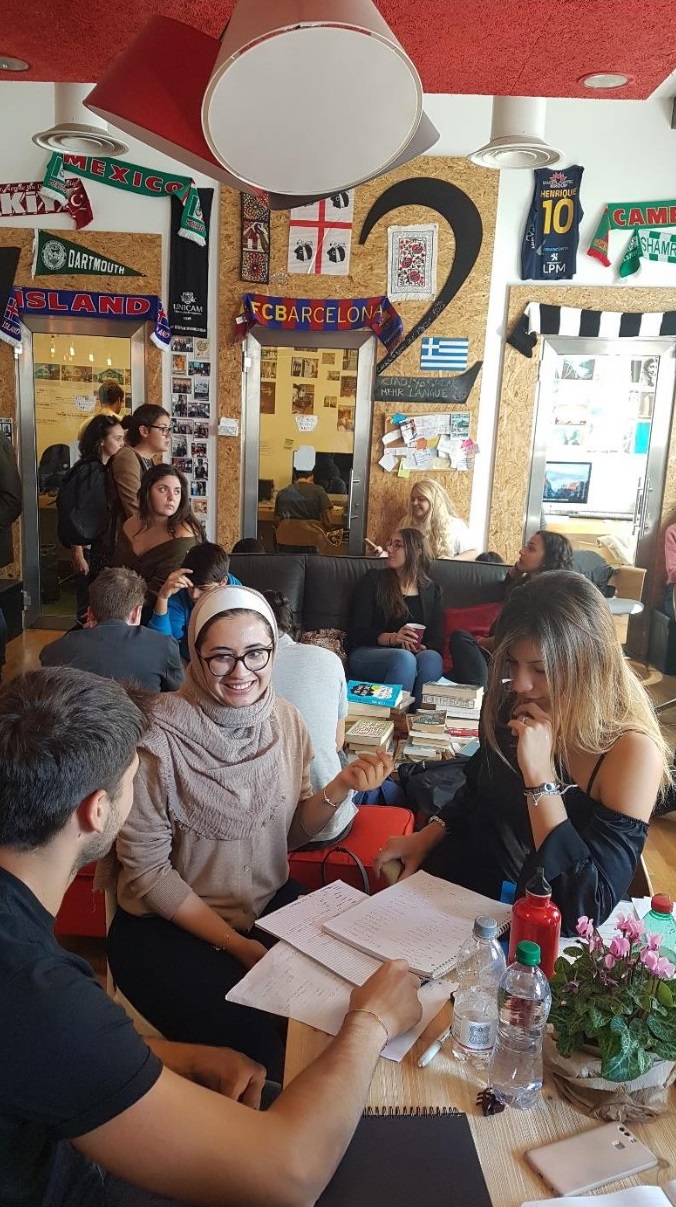Progetto Mediterraneo: Enhancing refugee self-reliance through access to tertiary education
Progetto Mediterraneo: Enhancing refugee self-reliance through access to tertiary education

Luiss Delegation with the selected students and the representatives of the University of Petra (University of Petra, Amman. July 2018)
The project in brief
The project is implemented by Luiss University in Italy. It began in September 2017 and should be completed in April 2028.
Progetto Mediterraneo, aims to offer education opportunities to refugee students and to students from disadvantaged backgrounds in order to promote their self-reliance and future personal emancipation. At the completion of their academic course they receive an international degree which facilitates their inclusion in the national and international job-market. Their competences will contribute to their personal growth and to the development of their communities and regions.
The main goals of the project are:
- Development of a legal and safe program which may offer University education to refugees living in countries of first asylum in the Mediterranean area.
- Development of a sustainable and effective model of inclusion for refugees in an Italian University such as Luiss University.
- Inclusion of refugees in the University community and development of a cosmopolitan responsibility within the faculty and the students’ community.
Elements that facilitated the project included:
- the concrete intention of the University to find a proper and innovative way to offer an education program to refugees from the Mediterraneanean region.
- the network of Luiss University and its cooperation with Fondazione Terzo Pilastro – Internazionale which co-sponsors the program “Progetto Mediterraneo”. In order to develop and manage this program, Luiss and Fondazione Terzo Pilastro – Internazionale established the Foundation “Fondazione Mediterraneo – Diritto allo studio Luiss Guido Carli”.
- the presence of a high-skilled staff within the University, dedicated to the development of this program. Specifically, Luiss Welcome Desk and Luiss Tutoring Service constantly monitor, support and inspire Progetto Mediterraneo. students during their learning experience in order to guarantee the regular progression of their academic careers.
- the international approach of Luiss University and its internationalization programs.
Main activities of the Good Practice
Progetto Mediterraneo, aims to offer education opportunities to refugee students and those from disadvantaged backgrounds in order to promote their self-reliance and future personal emancipation. At the completion of their academic course they will receive an international degree which will facilitate their inclusion in the national and international job-market. Their acquired competences will contribute not only to their personal growth but also to the development of their communities and regions. Moreover, the project offers full scholarships to the refugee students in order to facilitate their academic career and guarantee the correct completion of the degree. Education costs for each refugee are covered by the project.
Thanks to Progetto Mediterraneo I, 20 students (10 disadvantaged students from Jordan, 7 Syrian and Palestinian refugee students from Jordan, 3 disadvantaged students from Malta) had the opportunity to graduate (Bachelor Degree) in 2020; in 2022, 16 students (9 disadvantaged students from Jordan, 6 Syriana and Palestinian refugee students from Jordan, 1 disadvantaged student from Malta) graduated (Master’s Degree).
Since 2021, “Progetto Mediterraneo II” followed the previous “Progetto Mediterraneo” which had started in 2017. “Progetto Mediterraneo II” implies the cooperation of UNHCR operations in Italy, Jordan, Iraq, Lebanon, Morocco, Turkey and Nigeria.
Through “Progetto Mediterraneo II” Luiss selects refugee students in the above-mentioned countries in cooperation with UNHCR. Then, these admitted students are allowed to reach Italy in order to follow the University programs they chose; before and after their arrival in Italy, they are supported and guided by Luiss Welcome Desk and Luiss tutors.
The project offers full scholarships to the refugee students in order to facilitate their career and guarantee the correct completion of the degree.
Luiss Tutoring Service developed an inclusion program for these students which guarantees their quick inclusion and orientation in the Italian University system, in Luiss and in Rome. After their arrival refugees are paired to buddies, Luiss senior students who facilitates their inclusion in the community.
During their career, the students are monitored but the tutors and they are directly involved in Luiss extra-curricular activities or initiatives such as public events.
Moreover, the project aims to share the values of global engagement, inclusion and respect for diversity and the Luiss team is committed in the transmission of the mentioned values.
Before their graduation, Luiss staff organizes activities about the students’ employability in order to offer professional orientation regarding job careers and future opportunities.
Presently, “Progetto Mediterraneo II” involves 17 students selected among refugee population in Jordan, Lebanon, Morocco, Nigeria, Iraq and Turkey.
Partners involved
-
UNHCR-Italy and UNHCR operations in the country of departure
What challenges were encountered in delivering the project and how were they overcome?
Challenges
- management of the mobility of the refugee students (e.g. preparation of the travel documents and visa, request and renewal of the residence permits, etc.).
- management of individual critical situations.
- monitoring the individual careers in order to offer immediate support.
How they were overcome
- cooperation with UNHCR operations and with the Italian Institutions such as the Ministry of Foreign Affairs and relevant embassies.
- development of a local network with Luiss staff (e.g. Luiss tutors) and local bodies (e.g. Italian partner-bank for the opening of bank accounts).
- development of a dedicated team of tutors for international students.
Results of the Good Practice
-
Students can legally and safely move to Italy in order to access their University education thanks to Progetto Mediterraneo. Without this program they would not be able to start their University career in Italy or even in their own country of protection.
-
Students can have access to an international environment which contributes to develop a “large” learning experience: thanks to Progetto Mediterraneo, students can start a personal international network and, after graduation, they will be able to access job-positions that are usually out of reach for refugees.
In what way does the good practice meet one or more of the four objectives of the Global Compact on Refugees?
Objective 2: Enhance refugee self-reliance
Progetto Mediterraneo enhance refugee self-reliance because this program allows refugees to have the best learning experience and to complete their university career in time since it covers the costs of the fees, accommodation, meals, textbooks and pocket money. After their graduation they will be able to come back to their countries – if possible – or to their communities being their drivers of development.
Objective 3: Expand access to third-country solutions
Progetto Mediterraneo aims to expand access to third-country solutions since it represents a legal and safe way to allow refugee to come to Italy with a specific purpose, their education.
Next steps
If they will meet the annual requirements for the renewal of their scholarships, 6 students are expected to graduate in a.y. 2023-2024 (bachelor’s degree); 11 students are expected to graduate in a.y. 2024-2025 (bachelor’s degree).
If they will meet the admission requirements, the above-mentioned students may be offered scholarships to attend their master’s degree programs in Luiss starting from a.y. 2024-2025 (6 students) and from a.y. 2025-2026 (11 students).
Are there areas in which support would be required to continue and/or scale up your good practice?
- preparation and monitoring of the students’ documents.
- empowerment of the students’ employability.
Submitted by
Andrea Prencipe, Rector - [email protected]




